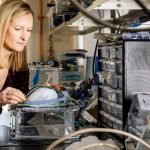New spin control method brings billion-qubit quantum chips closer
Engineers have discovered a new way of precisely controlling single electrons nestled in quantum dots that run logic gates.
2D material may lead to sharper smartphone photos in low light
A new type of active pixel sensor that uses a novel 2D material may enable ultra-sharp cell phone photos and create a new class of extremely energy-efficient Internet of Things sensors.
Scientists find innovative way to harvest the waste energy from human body
Scientists have invented a low-cost, innovative way to harvest the waste energy from VLC by using the human body as an antenna.
Scientists develop a cool new method of refrigeration
Adding salt to a road before a winter storm changes when the ice will form. Researchers have applied this basic concept to develop a new method of heating and cooling.
Scientists are at the edge of graphene-based electronics
Georgia Tech researchers developed a new nanoelectronics platform based on graphene - a single sheet of carbon atoms.
A pressing quest in the field of...
Sunswift 7 solar-powered electric car goes 1000km on a single charge
UNSW Sydney’s Sunswift 7 solar-powered electric car has claimed a provisional Guinness World Record by going 1000km on a single charge in under 12 hours.
A little more salt may keep batteries from catching fire
Lithium-ion batteries that contain a new non-flammable electrolyte can continue to function at high temperatures without catching fire.
Why nuclear fusion is so exciting?
The Lawrence Livermore National Lab in California last week achieved fusion with a net energy gain, the U.S. Department of Energy reported on Thursday.
New study could help make more durable solar cells
Scientists have developed a way to use perovskite in solar cells while protecting it from the conditions that cause it to deteriorate.
MIT engineers design a soft, implantable ventilator
A new proof-of-concept design by MIT engineers aims to one day boost the diaphragm’s life-sustaining function and improve lung capacity for people with diaphragm dysfunction.










